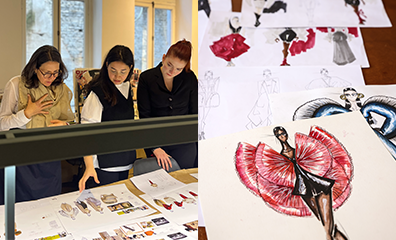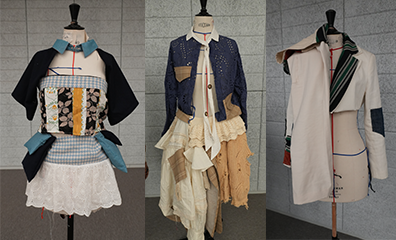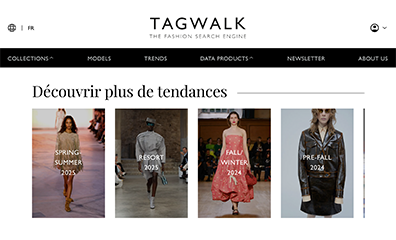Alumni Interview: Andrea Herget - IFA Paris MBA Fashion Business Graduate
Posted on 15/05/2020
Austrian born Andrea Herget, co-founder of the startup The Retouch, won the first Future Innovation Award, a prestigious prize launched by the Parisian fashion tech lab Foundry Powered by IFA Paris and its partner IBM. This award aims to support young entrepreneurs who demonstrate high potential in their desire to transform the fashion industry
Andrea, can you tell us more about you, where do you come from and can you let us know about your career, path, journey to IFA Paris and to the fashion world?
Andrea Herget: I grew up in a city called Graz in Austria. My desire to break out of the small city life, brought me to move to Vienna to study international business administration. In Vienna I got a first taste of my dream to work in fashion and soon after moving there I have created a fashion and style blog called La Viennoise. My intention was to gain a foothold into the industry and make connections. Soon after, I moved to Paris for my Erasmus semester at Paris Dauphine, where I realized that my place was really to join the fashion industry. After returning to Vienna, I found a job at the sustainable fashion brand Sightline. My boss was very engaged into green fashion and politics in Vienna. She gave my all the basics on sustainable fashion. Then, I got accepted at IFA Paris and moved to Paris for my masters, with the goal to follow a career in sustainable fashion.
So this is how step by step was born The Retouch’s project.
Andrea Herget: During my studies at IFA Paris, I joined the NGO CEC Circular Economy Club, as a volunteer for sustainable fashion. This work inspired me to write my master thesis at IFA Paris about Circular Fashion Systems. I succeeded to make a visit at the Tencel (1) production in Austria and to interview Bruno Pieters, the founder of HonestBy (2). My first professional project in sustainability has been with Sondes Louati Jarraya, who worked fifteen years at Chanel as a couturier in Haute Couture and has created a new technology to produce garments with less ecological impact. Her patented technology convinced me and I helped her to create her business plan. This project gave me insights into how to transform garments and especially into the technicity of garments and the possibilities to extend the life of a garment. At the end of this project, my partner and I had the idea, to conduct a research on garment alterations and soon after we came up, around a year ago, with the idea of The Retouch.
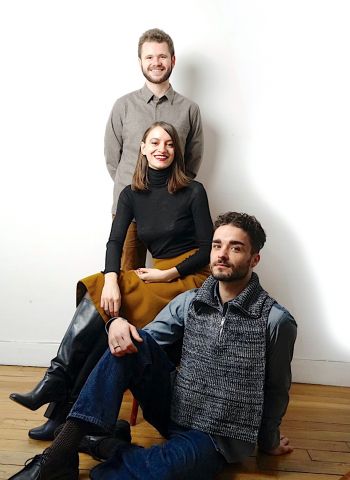
Andrea Herget with Jules-Adrien Neret (top) and Andrea Millerand (bottom).
You won the very first IFA Paris x IBM Future Innovation Award. Could you say two words about this award, what’s your feeling and what does it changes for you?
Andrea Herget: Being the winner of the IFA x IBM Future Innovation Award, represents our first official confirmation that our project has proven its necessity and interest. Our small team, with my partner, Jules-Adrien Neret, and Andrea Millerand, the creative part of our company, we gained confidence and are now ready to take up the challenge to reinvent the current market of garment maintenance services.
You made an ambitious and complete research on circular economy systems related to the fashion industry. How this topic came to your mind originally? What did motivate you? Maybe did you think that it was really times for changes?
Andrea Herget: At the time I started my IFA Paris MBA Fashion Business, I was already frustrated about the environmental and ethical problematics in this industry. I was in a conflict with myself. I loved clothes, fashion, the good part of this industry. On the other hand, I was upset that this industry has done so little to limit being wasteful and polluting. I had to find a compromise if I wanted to stay in this industry. I decided to learn about sustainable fashion. But in my researches, a lot of focus was on the agriculture, production (how certain parts of production use x amount of energy or water) and fabrics (alternatives to cotton and polyester). These topics are interesting but difficult to change, unless to get into production or become a chemist. Few information and talks had been around the recycling, reuse, repairing part. My conclusion was that sustainable fashion did not approach the real and major problematic of this industry, which is the overconsumption and its cause. Because there are few options to reuse clothing! When I decided on my topic, there was no theoretical research published on Circular Economy combined with the fashion industry. For me it was very exciting to combine them. I had to read a lot about circular economy to understand the mechanics, as a result to apply it to the industry. One month before my research has been published, The Ellen McArthur Foundation published a wholistic research about the problematics in the fashion industry combined with circular economy. I found lots of similarities with my research. It gave me really the basics for everything what I do today.
We know that the fashion industry is fast, extremely complex at it employs millions of people. It has a heavy impact on environment and count among the most polluting. During your study and until today, do you witness radical changes in terms of ethic and action?
Andrea Herget: During my study in 2017, I got more and more interested in sustainable fashion. I am from Austria, not really a country interested in fashion. However the ethical and environmental aspects of a garment mattered since a while ago. The people are more interested in the functionality and correctness of the production than the style aesthetics. Also, I feel like UK, Sweden, Denmark have been earlier on the topic of sustainable fashion, as France, where things started to really shift few years ago. First it was like NGOs and alternative fashion brands. And now it reached conglomerates. LVMH and Kering are investing into sustainable fashion and new regulations have been decided by the government which help and push the industry to change, such as the law which prohibits brands to burn or throw away their collections. NGOs, governments and companies have to work together and continue the path of creating regulations, also to keep pressure on companies which are not interested in change.
If I understand well, you think that small entities and start-ups are from now on the driving force to help adapting ourselves to a new and more efficient way of recycling?
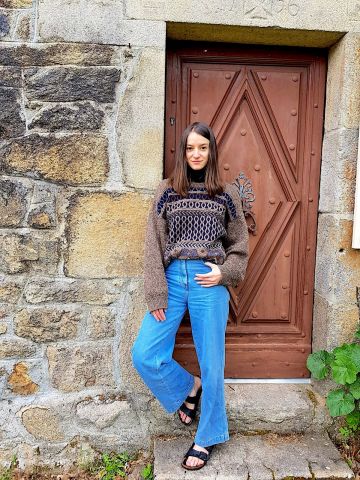
Andrea Herget
Andrea Herget: I think, that start-ups generally, whether it is the fashion or other industry are dictating innovation. A great example are tech companies. Tech start-ups have disrupted the way we live today, Instagram, WhatsApp or Microsoft and Apple where started by some students! In the fashion world, the hot topic today is sustainability. And the solutions today come from start-ups.
This is also the reason why LVMH, Kering and all the big companies invest into start-ups.
Are you concerned about wastes such as plastics and microplastics landing in the ocean?
Andrea Herget: Yes! Plastic is huge problem for our planet. When you hear that one third of the all plastics produced leak into our ecosystems, and that around 2050 more plastics than fish will be in the oceans, it is indeed very shocking. For the fashion industry, it is the microfibers in synthetical fibres who pose the problems, when they are washed and as a result enter the oceans, where fish eat them, and we eat the fish. So, we are in a never-ending circle where plastic entered long time ago in our food chain. The European Union created a new guideline for washing machine producers to integrate a filter into the newly produced washing machines. That way the microplastics are filtered. Moreover, there is a lot of innovation going on to replace synthetic fibres in the future. But still there is a long way to go…
Does the “sustainable thinking” is more a trend, a fashion? Or a real and concrete concern among brands?
Andrea Herget: It’s not just a trend. I like to compare sustainable fashion with the food industry. You remember when bio fruits and vegetables where only available in special shops and when bio was only considered for the rich. Now bio became almost the standard. We are well aware of why pesticides and fertilizers are so harmful for our bodies and health, and the general public is conscious. The fashion industry is going through the same phase now. Sustainable fashion, a decade ago, was still seen as an alternative movement, and few people knew the dark side of the fashion industry. But today, we have seen documentaries, read and heard a lot of the environmental and ethical problems of the fashion industry. It has gone so far that even H&M, Zara are creating sustainable fashion lines – and Fast Fashion is known for jumping on every trend! Indeed, we are in a serious situation. Our world is finite. And we have to take strict steps to stop global CO2 emissions. I do think that consumer behaviour is shifting and as I mentioned above, governments and companies are working on changing the system. Hopefully it won’t be too late. I am positive and I think in times of crises such as now, we can see the solidarity of the society and that with the same solidarity we can also fight the climate crises.
You are ready to launch your business called The Retouch. Can you describe its line of activities?
Andrea Herget: The Retouch (3) main goal is to increase clothing reutilization in the fashion industry. We are an online garment maintenance service. Our vision is to revolutionize the current garment alteration market. We give your clothes a second life, by proposing an alternative to reselling, donating or disposing of them. Repair, redesign, reinvent, that’s The Retouch!
(1)
www.tencel.com
(2) A collection and e-commerce site that is very transparent.
(3)
www.theretouch.fr
For more information on the program Andrea pursued at IFA Paris: MBA Fashion Entrepreneurship - Tech Major
